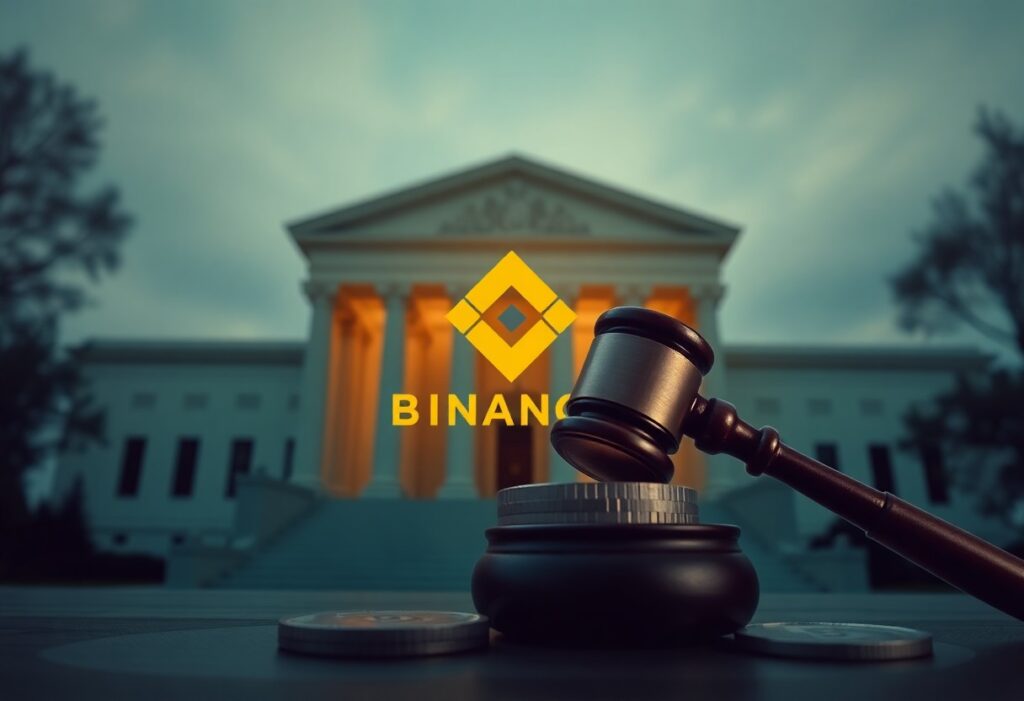Now Reading: Is the SEC tightening its grip on DeFi?
-
01
Is the SEC tightening its grip on DeFi?
Is the SEC tightening its grip on DeFi?
SEC regulations are gaining attention as they seek more control over the rapidly evolving world of decentralized finance (DeFi). As you explore this space, you might notice increased scrutiny on projects and governance tokens that could impact your investments and participation. The agency’s actions signal a desire to create clear regulatory frameworks to protect investors while also balancing innovation. Understanding these developments can help you navigate the potential risks and opportunities that may arise in this changing landscape.
Key Takeaways:
- Regulatory Scrutiny: The SEC is increasingly focusing on DeFi projects, assessing compliance with existing securities laws.
- Clarity for Investors: Aimed at protecting investors, the SEC is emphasizing the need for transparency in DeFi protocols.
- Enforcement Actions: The agency is expected to take stronger enforcement actions against DeFi platforms that do not adhere to regulations.
- Innovation vs. Regulation: Balancing innovation in the DeFi space with necessary regulations poses a considerable challenge for the SEC.
- Future Guidance: The SEC may issue more guidance to help DeFi projects understand their obligations under U.S. law.
Overview of DeFi and Its Rapid Growth
A remarkable phenomenon in the financial landscape, Decentralized Finance (DeFi) has experienced exponential growth, attracting billions in investment and drawing increased attention from regulators. As the US government tightens its DeFi net with raft of rule proposals, it’s imperative to understand the implications of this burgeoning sector on the future of finance.
What is DeFi?
DeFi, or Decentralized Finance, refers to a blockchain-based form of finance that eliminates intermediaries, enabling peer-to-peer transactions and smart contracts. This ecosystem offers innovative financial services such as lending, borrowing, and trading, all conducted on decentralized networks, giving you greater control over your assets.
Key Players and Technologies
Overview of DeFi highlights various key players and technologies that prop up this dynamic sector. Major platforms like Ethereum, Uniswap, and Aave have emerged as leaders, providing decentralized protocols for activities such as token swaps and liquidity provision. You will encounter a wide array of digital wallets, lending platforms, and decentralized exchanges, all contributing to the thriving DeFi ecosystem.
Understanding the landscape of DeFi’s key players and technologies is vital for navigating this financial frontier. Ethereum serves as the backbone for many projects, with its smart contract functionality enabling secure and transparent transactions. Platforms like Uniswap revolutionize trading by allowing you to swap tokens directly without intermediaries. Meanwhile, Aave and similar lending protocols allow you to borrow and lend assets seamlessly, paving the way for a financial ecosystem that offers both innovation and flexibility in managing your finances effectively.
The Role of the SEC in Regulating Financial Markets
The Securities and Exchange Commission (SEC) plays a pivotal role in regulating financial markets, ensuring transparency and protecting investors. As the lines between traditional finance and decentralized finance (DeFi) blur, the SEC’s vigilance is more pronounced, as outlined in Crypto and DeFi: new operational risk landscapes for banks. Your understanding of these regulatory dynamics is vital in navigating the evolving landscape.
Historical Context of SEC Oversight
Oversight of financial markets by the SEC dates back to the Great Depression, aiming to restore investor confidence through regulatory frameworks. This historical context has shaped the current landscape, where the SEC continuously adapts to challenges posed by evolving financial products and technologies.
Recent Developments in SEC Policy
Recent shifts in SEC policy reflect an increased focus on the DeFi sector as it gains mainstream traction. In particular, the SEC has ramped up its scrutiny of DeFi projects and tokens, emphasizing their potential classification as securities. This move impacts your investment strategies and portfolio decisions significantly, serving as a warning that regulatory frameworks can change rapidly.
Even as DeFi thrives, this intensified regulatory environment can present both threats and opportunities for you as an investor. The SEC’s recent actions indicate its determination to enforce compliance, highlighting the importance of understanding potential legal ramifications for DeFi projects. While this might seem daunting, adhering to compliance could bolster the legitimacy and stability of the DeFi ecosystem, ultimately benefiting your investments. Stay informed, as these developments may reshape your approach to the evolving landscape.
SEC Actions Targeting DeFi Projects
All eyes are on the SEC as it intensifies its scrutiny of decentralized finance (DeFi) projects. Recently, regulatory bodies have been proactive in addressing potential violations among these platforms, launching investigations and enforcement actions against various entities operating in the DeFi space. With a heightened focus on investor protection and market integrity, it’s necessary to understand how these actions may impact your involvement in DeFi.
Notable Enforcement Cases
Beside numerous informal inquiries, the SEC has initiated formal actions against well-known DeFi projects that allegedly offered unregistered securities. Cases involving substantial fines and settlement agreements highlight the regulatory challenges that DeFi platforms face. Staying informed about these developments can help you navigate the evolving landscape more effectively.
Impact on DeFi Platforms and Users
Impact on DeFi platforms and users is significant, as increased regulatory oversight leads to uncertainty in this once-unfettered space. You may experience decreased liquidity and a shift in the operational landscape as some projects decide to alter their frameworks or even cease operations due to fear of penalties.
Even as the SEC addresses compliance, you should be aware that some DeFi platforms may enhance compliance measures to mitigate risks and continue operations. This shift could promise greater legitimacy in the long run, but it might also introduce more stringent restrictions that could limit your flexibility as a user. Ultimately, while the SEC’s actions serve to protect investors, they also present challenges that you must be prepared to navigate in your DeFi endeavors.
Challenges in Regulating Decentralized Finance
Unlike traditional financial systems, decentralized finance (DeFi) operates without a central authority, creating multiple challenges for regulators. This lack of centralization complicates oversight, making it difficult for the SEC or other regulatory bodies to enforce compliance effectively. Moreover, the rapid evolution of technology often outpaces regulatory frameworks, leaving significant gaps that could be exploited. As a result, the regulatory landscape remains ambiguous, posing risks for both consumers and businesses involved in DeFi.
Jurisdictional Issues
Regulating DeFi entails navigating complex jurisdictional issues due to its borderless nature. Traditional regulations are often tied to specific geographical locations, yet DeFi platforms operate globally, making it nearly impossible to apply local laws uniformly. This discrepancy raises concerns regarding accountability and compliance, as entities may choose to operate in jurisdictions with the most favorable regulatory environments. As a result, determining which regulatory body has authority over specific platforms or assets becomes a daunting task.
The Nature of Decentralization
At its core, decentralization empowers users by distributing control across a network rather than relying on a single entity. This innovation fosters a sense of autonomy and innovation, encouraging the development of diverse financial products. However, this freedom can also lead to a lack of accountability. The absence of a central authority means that users often bear the responsibility for their actions, leaving investors vulnerable to scams and fraud. Additionally, the transparency of transactions can obscure the identities of bad actors, making it challenging for regulators to impose sanctions.
Finance is revolutionized in DeFi, offering opportunities for unprecedented financial freedom and inclusion. Nevertheless, this decentralized environment introduces significant risks, such as a lack of consumer protection and potential for manipulation. While you can engage with these innovative platforms, it’s vital to be aware of the potential dangerous implications of engaging with unregulated networks. As you navigate this landscape, understanding the inherent risks will help you make informed decisions in your financial endeavors.
Industry Response to SEC Scrutiny
Not surprisingly, the recent scrutiny from the SEC has prompted a variety of responses from the DeFi industry. Companies are actively engaging in discussions about compliance practices and the potential need for regulatory clarity. Many are also reevaluating their policies and business models to align with the evolving regulatory landscape, hoping to foster a more cooperative relationship with regulators while maintaining innovation.
Compliance Measures
Below, you will find that several DeFi projects are implementing compliance measures aimed at reducing regulatory risks. This includes conducting thorough audits, enhancing KYC processes, and collaborating with legal experts to better understand and navigate the complex regulatory environment. By doing so, they’re attempting to reassure both regulators and users about their commitment to operating within legal boundaries.
Community Reactions and Strategies
Against the backdrop of increased scrutiny, community reactions within the DeFi space have been mixed. Many in the community view the SEC’s actions as a threat to innovation, while others see an opportunity to engage constructively with regulators. Strategies include fostering dialogue with regulatory bodies and promoting educational initiatives that emphasize transparency and compliance, effectively taking proactive steps to build a more sustainable DeFi ecosystem.
Compliance measures are gaining traction as the community recognizes the importance of addressing regulatory challenges. By actively participating in regulatory discussions, you can help to drive more enlightened policies that support growth while mitigating risks. This approach not only demonstrates your commitment to adhering to regulations but also positions the DeFi space as a trustworthy sector in the eyes of traditional finance and regulators. Building partnerships and investing in shared knowledge will ultimately enhance your standing and shape the future landscape of DeFi.
The Future of DeFi Under Regulatory Pressure
To navigate the evolving landscape of decentralized finance (DeFi), you must recognize the balancing act between innovation and compliance. Regulatory scrutiny will likely shape the future of DeFi platforms, compelling them to adapt to stricter guidelines while still striving to maintain the ethos of decentralization and user autonomy. Understanding this dynamic relationship will prepare you for the shifts ahead.
Predictions and Trends
Across the DeFi sector, you can expect an increased focus on regulatory compliance. This trend may lead to greater transparency and user protection but could also stifle innovation. By anticipating these changes, you can better position yourself to take advantage of new opportunities within a potentially more constrained environment.
Potential Pathways for DeFi Evolution
Pathways for DeFi evolution will likely emerge through increased collaboration with regulators. You might see platforms implementing KYC (Know Your Customer) measures to meet compliance standards, thus attracting more mainstream users and institutional investors. Additionally, the sector could witness the development of hybrid models that integrate both DeFi’s decentralized principles and the regulatory framework required for broader acceptance.
The transition towards a regulated DeFi landscape will not happen overnight. As DeFi platforms strive to comply with regulations, they may innovate to enhance user experiences, focusing on interoperability and enhanced security protocols. This evolution could also see the rise of regulated stablecoins and insurance products designed to safeguard user funds, thereby increasing consumer confidence. You should stay vigilant about these developments, as they will likely dictate how you engage with DeFi in the future.
Final Words
Summing up, as the SEC continues to increase scrutiny on DeFi platforms, you should stay informed about the evolving regulatory landscape. Your understanding of these developments is important, as they may impact your investments and the overall accessibility of decentralized finance. The trend suggests that the SEC is taking steps to ensure compliance and protect investors, so keeping a close eye on these changes will help you navigate the DeFi space more effectively.
FAQ
Q: What actions has the SEC taken regarding DeFi recently?
A: The SEC has recently increased its scrutiny of decentralized finance (DeFi) platforms. This includes issuing warnings and guidance about regulatory compliance, especially concerning securities laws. The SEC has also brought several enforcement actions against entities in the DeFi space that it believes are violating these laws.
Q: How does the SEC determine whether DeFi projects fall under its jurisdiction?
A: The SEC determines jurisdiction based on the application of the Howey Test, which assesses whether certain transactions can be considered investment contracts. If a DeFi project offers tokens or services that resemble traditional securities or promises returns dependent on others’ efforts, it may fall under the SEC’s regulatory purview.
Q: What implications do SEC regulations have for DeFi developers?
A: Regulations from the SEC can have significant implications for DeFi developers, including the potential need to register their tokens as securities, comply with anti-money laundering (AML) regulations, and potentially facing legal repercussions for non-compliance. Developers may need to rethink their project structures, funding methods, and operational transparency to align with regulatory expectations.
Q: Are there any risks for investors participating in DeFi amid regulatory changes?
A: Yes, investors in DeFi are exposed to several risks, especially as regulatory landscapes evolve. These include the risk of investment in projects that may later be deemed illegal by the SEC, leading to potential loss of capital. Additionally, regulatory actions can lead to market volatility and increased uncertainty about the legality and future of certain DeFi projects.
Q: What is the potential future of DeFi amidst SEC involvement?
A: The future of DeFi in the context of SEC involvement could lead to a more regulated and compliant industry, which may foster greater trust among traditional financial participants. However, this may also stifle innovation and make it more challenging for new projects to launch without navigating complex regulatory frameworks. The balance between innovation and regulation will be crucial for the evolution of DeFi.





















